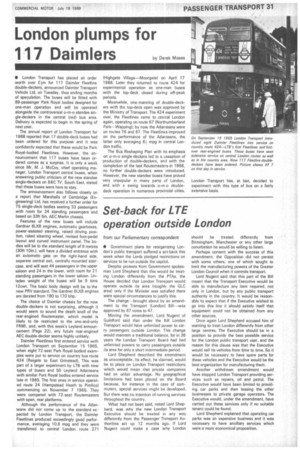Set-back for LTE operation outside London
Page 33

If you've noticed an error in this article please click here to report it so we can fix it.
from our Parliamentary correspondent • Government plans for reorganizing London's public transport suffered a set-back this week when the Lords pledged restrictions on services to he run outside the capital.
Despite protests from Government spokesman Lord Shepherd that this would be treating London differently from the PTAs, the House decided that London Transport would operate outside its area (roughly the GLC area) only if the Minister was satisfied there were special circumstances to justify this.
The change brought about by an amendment to the Transport (London) Bill--was approved by 67 votes to 47.
Moving the amendment, Lord Nugent of Guildford said that under the Bill London Transport would have unlimited power to carry passengers outside London. This change would maintain a traditional balance, for in 36 years the London Transport Board had had unlimited powers to carry passengers outside its area for only a short intermediate period.
Lord Shepherd described the amendment as unacceptable. Its effect, he claimed, would be to place on London Transport restrictions which would mean that private companies had an unfair advantage. No geographical limitations had been placed on the Board because, for instance in the case of commuters, special services might be developed. But there was no intention of running services throughout the country.
What had not been said. noted Lord Shepherd, was why the new London Transport Executive should be treated in any way differently from the Passenger Transport Authorities set up 12 months ago. If Lord Nugent could make a case why London should be treated differently from Birmingham, Manchester or any other large conurbation he would be willing to listen.
Perhaps content with the success of this amendment, the Opposition did not persist with some others, one of which sought to limit the manufacturing powers of the Greater London Council when it controls transport.
Lord Nugent said that this part of the Bill meant that the Transport Executive would be able to manufacture any item required, not only in London, but by any public transport authority in the country. It would be reasonable to expect that if the Executive wished to go into this line it should satisfy itself that equipment could not be obtained from any other sources.
Once again Lord Shepherd accused him of wanting to treat London differently from other large centres. The Executive should be in a position to provide the best possible service for the London public transport user, and the reason for this clause was that the Executive would sell its vehicles from time to time. So it would be necessary to have spare parts for these vehicles and the Executive would be the best organization for manufacturing them.
Another withdrawn amendment would have stopped London Transport providing services such as repairs, oil and petrol. The Executive would have been limited to providing car parks and then leasing the other businesses to private garage operators. The Executive would, under the amendment, have carried out these services only if no suitable tenant could be found.
Lord Shepherd explained that operating car parks was an expensive business and it was necessary to have ancillary services which were a more economical proposition.
















































































































